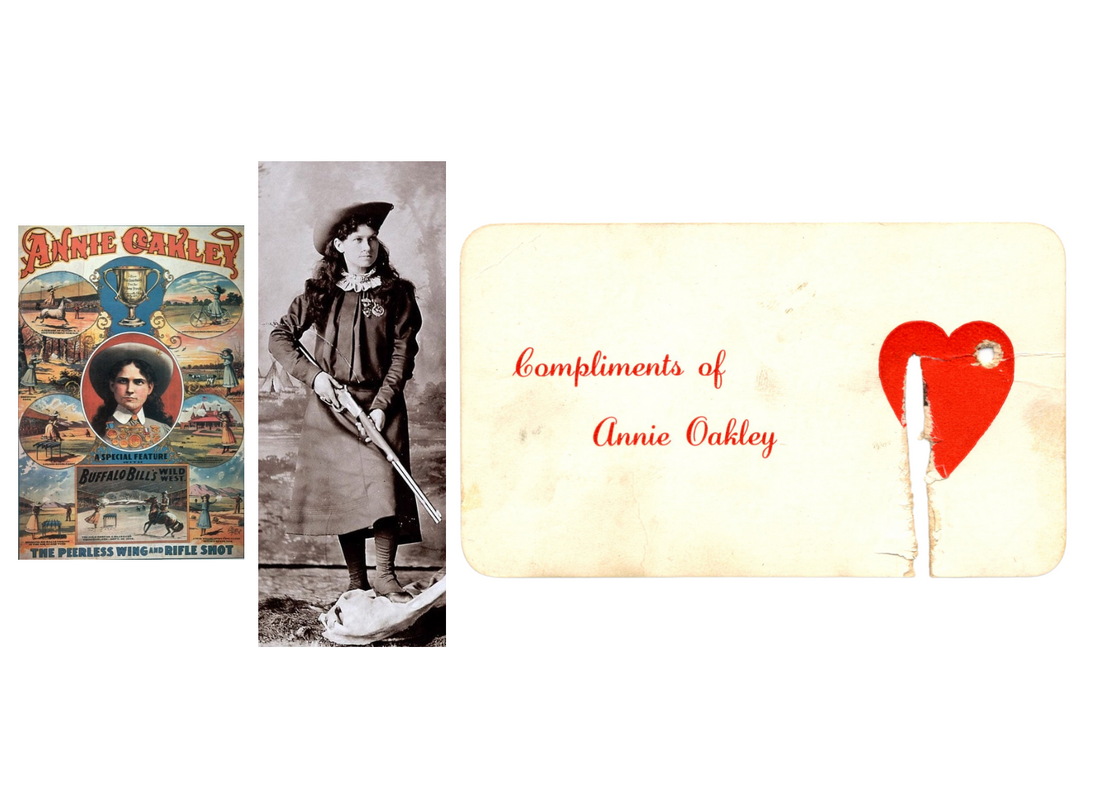
A Shot Through History: Annie Oakley’s “Compliments” Card and the Legend of Her Unmatched Marksmanship
Share
Unlike many historical dealers, our gallery has always taken a different approach. We are collectors, and over the years, we’ve carefully built a private collection of unique and irreplaceable relics—items we’ve chosen to hold back, not for quick sales, but for the sheer joy of preserving pieces of history. Most of these treasures are rarely shared with the public. But every so often, a showstopper comes along that deserves its story to be told. This is one of those moments.
Today, we’re proud to highlight an extraordinary artifact: an original Annie Oakley “Compliments” card, complete with her signature bullet hole and an awe-inspiring track from a legendary sharpshooting trick.

The Legend of Annie Oakley: From Frontier Girl to Global Icon
Annie Oakley’s story feels so familiar that it’s easy to take for granted—but her rise from poverty to international fame is nothing short of extraordinary. Born Phoebe Ann Mosey in 1860 in Darke County, Ohio, to a dirt-poor Quaker family, she learned to shoot as a young girl, using an old muzzle-loader to help put food on the table. Her remarkable marksmanship quickly set her apart, leading to a pivotal moment when she defeated professional show shooter Frank Butler in a match. Their encounter led not only to a marriage but also to a legendary partnership that would define both their lives.
By 1892, Annie Oakley was so renowned that Harper’s Weekly declared she needed no introduction. In just 32 years, she had gone from a farm girl in Ohio to the toast of two continents. As the star attraction of Buffalo Bill's Wild West Show, she captivated audiences with her astonishing skill, performing for royalty and heads of state, including Queen Victoria and Kaiser Wilhelm II. Her precision, poise, and down-to-earth demeanor made her a beloved figure in both America and Europe.
Annie's marriage to Frank Butler is a story in itself. An Irish immigrant ten years her senior, Frank was a kindred spirit—gentle, supportive, and modest. He famously courted Annie by sending her poems and letters “signed” by his dog, George. Though records suggest they married in 1882, Annie insisted it was 1876; either way, their union was a loving and enduring partnership. Frank willingly stepped into the background, serving as her manager and constant support, a remarkably modern dynamic for the era. Their marriage, which lasted nearly fifty years, only ended with their deaths—poignantly just 18 days apart in 1926.
Their lack of children made their extended family ties even stronger. Annie and Frank doted on nieces, nephews, and siblings, maintaining a deep familial bond that is vividly reflected in personal letters and family memories. Their private lives, characterized by mutual respect, devotion, and a shared passion for their craft, were far more stable than the dramatized versions later portrayed on stage and screen.

Indeed, Annie Oakley’s legacy has been continuously reimagined. From Barbara Stanwyck’s portrayal in RKO’s 1935 biopic to Ethel Merman’s brassy Broadway version in Annie Get Your Gun, her image evolved with the times. The 1950 film adaptation and Gail Davis’s portrayal in the 1950s Gene Autry TV series further cemented her place in American pop culture. Yet, these versions often fictionalized tensions and romanticized struggles that Annie and Frank themselves never indulged. Their real story was one of quiet strength, equality, and shared purpose—a partnership that was ahead of its time.

Despite the embellishments, Annie’s legend endures, fueled by her unmatched talent, indomitable spirit, and the timeless appeal of a woman who could outshoot anyone and still carry herself with grace.

Annie Oakley and the Buffalo Bill Wild West Show
For nearly two decades, Annie Oakley was the undisputed star of Buffalo Bill’s Wild West Show, an international spectacle that brought the romance and ruggedness of the American frontier to audiences around the globe. Joining the show in 1885, Oakley quickly became one of its most celebrated attractions, dazzling spectators with her uncanny marksmanship and effortless charm.
Her performances were nothing short of breathtaking. Annie could shoot the ashes off a lit cigarette held in her husband Frank Butler’s lips, split playing cards in midair, and hit dimes tossed high into the sky—all with a level of precision so flawless it seemed almost supernatural. One of her favorite tricks was shooting through the thin edge of a playing card, a feat of skill and nerve that left crowds in awe. It was stunts like these that gave rise to her iconic “Compliments of Annie Oakley” cards, which she would perforate with bullet holes as a keepsake for lucky spectators.
But Oakley was more than a sharpshooter—she was a pioneer who redefined what was possible for women in a male-dominated world. In an era when women were expected to stay silent and domestic, Annie strode confidently onto stages, rifle in hand, and proved that skill, precision, and grace knew no gender. She became a cultural symbol of frontier spirit, female empowerment, and American determination, shattering stereotypes with every shot she fired.
Her fame transcended national borders. Annie performed before Queen Victoria during the Golden Jubilee in 1887, charming the monarch and earning the affectionate nickname "Little Sure Shot" from Sitting Bull, the famous Lakota leader who once joined the show. She amazed Kaiser Wilhelm II of Germany, famously shooting the ash off his cigarette at his own request—a performance steeped in legend and irony, especially considering later events of history. Oakley’s exhibitions weren’t just entertainment; they were diplomatic showpieces, showcasing American skill, ingenuity, and showmanship to the world.

The Wild West Show itself was a masterclass in myth-making. Blending live-action reenactments of frontier battles, cattle drives, and Native American dances, it presented a romanticized version of the American West that captivated imaginations across Europe and America. Yet amid the spectacle, Annie Oakley’s act stood apart—not just for its sheer technical brilliance, but for its authenticity. Unlike staged gunfights and dramatized rodeos, her precision shooting was the real thing.
Annie’s time with Buffalo Bill's Wild West Show helped elevate her from a talented performer to a global icon. She wasn't just representing herself; she became the living embodiment of the American West—resilient, independent, and impossibly accurate.

The Iconic "Compliments of Annie Oakley" Card Trick
Among her most famous acts was the “Compliments” card trick, a demonstration of pinpoint accuracy and crowd-pleasing bravado. Annie would invite a guest to the arena floor, hand them a small card emblazoned with a red heart and the words "Compliments of Annie Oakley," and instruct them to hold it up in front of the crowd.
With calm confidence, she’d raise her rifle and—bang!—put a bullet cleanly through the heart symbol. But she wasn’t done. In a second act of sheer showmanship, she’d challenge the guest to hold the card sideways, presenting only its thin edge to her. Once again, she’d take aim and fire, the bullet slicing along the card’s edge with surgical precision. The crowd would erupt in applause, witnessing a feat of marksmanship that bordered on the impossible.
The Relic: A Shot Through Time
The example featured here is a rare surviving card from that very performance. It bears both the clean bullet hole through the heart and a distinct bullet track along the edge, evidence of that spectacular second shot.

On the reverse is a period pencil inscription reading:
"Shot at 30 ft – Card held edgewise in hand of Ole Bill’s."
This brief note captures the magic of the moment, preserving a story of skill, courage, and showmanship in Oakley’s own era.

A Coveted Collectible
These “Compliments of Annie Oakley” cards are among the most prized relics associated with her. Heritage Auctions has sold only two examples, highlighting their rarity. In the 2012 Wild West Auction, one such card, just like ours, fetched $7,767.50, with Heritage calling it "One of the most prized of Annie Oakley collectibles, a 'heart' card with her 'signature' bullet hole." In the same auction, a similar example featuring an image of Oakley holding a rifle soared past $14,000.
A Relic Worthy of the Spotlight
For collectors of Western Americana, sharpshooting history, or iconic women’s history, this is far more than just a card. It is a tangible connection to one of the greatest legends of the Wild West—an artifact that encapsulates the precision, charisma, and enduring legacy of Annie Oakley.
We're proud to share this remarkable piece from our private collection. It is a glimpse into the world of showmanship, skill, and spectacle that defined Annie Oakley and the Buffalo Bill Wild West Show.
